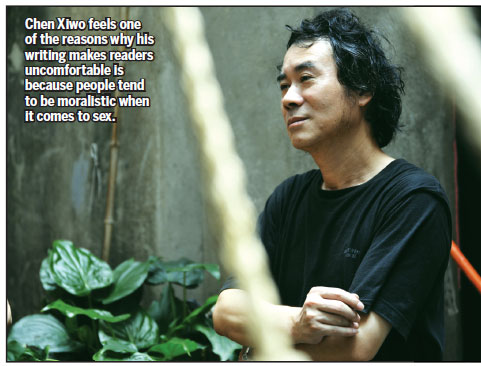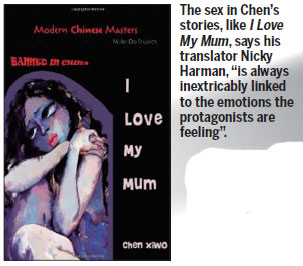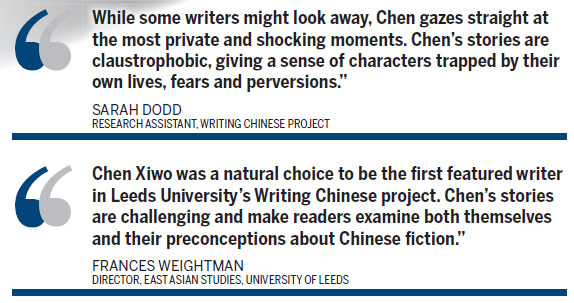The naked truth
Updated: 2014-10-10 05:45
By Chitralekha Basu and Sun Li(HK Edition)
|
|||||||
Even as Chen Xiwo's works - known for their explicit descriptions of violent and deviant sex - get noticed by the Anglophone audience outside China, Chitralekha Basu and Sun Li discover that the writer may be, in fact, a closet romantic.
Even as he is eager for feedback on The Book of Sins, a collection of seven novellas (translated into English by Nicky Harman and published by Forty-six Books in the UK and Hong Kong this month), Chen is equally keen to talk about being a writer in present-day China.
Chen is the first writer to visit England as part of Leeds University's prestigious Writing Chinese project - a showcase of distinguished Chinese literary voices in the UK. He sees the visit as an opportunity to "bridge the cultural barrier, have foreigners take note of my work and expose them to Chinese society at the same time".
Back home he is probably better known for his purple prose than as a chronicler of contemporary Chinese society. In the popular imagination Chen is associated with graphic detailing of sexual excesses - often both violent and deviant. He is the writer who famously got into a tangle when Customs officials in his home province of Fujian refused to allow him to take delivery of a cache of his own books published abroad, because of their apparent "pornographic" content.
Chen's tales abound with people who are as violent as they are loathsome. In The Man with a Knife a powerful writer who routinely trades his influence for sexual favors ends up castrating himself. A paraplegic who sleeps with his mother lashes her to death in I Love My Mum. Chen Xiwo is not an author one might want to read for pleasure.
The truth of the matter is that the sexual content in his writing is probably not about sex at all. To put it in his own words, "in my work sex is not so much in the physical act but it represents the depths of the human psyche." Nicky Harman, who translated his works, adds, "In Chen, the sex is never gratuitous; it's always inextricably linked to the emotions the protagonists are feeling."
In the story Kidney Tonic, for instance, a salesman who peddles re-vitalizing supplements, and who begins spying on his neighbor and his wife - watching them in the act - might be imagining the whole thing. In obsessing over his neighbors' sex lives, he loses track of his own and gets irrevocably entangled in theirs. In the end his identity is completely suffused with that of the masturbating ailing man next door and he is none the wiser for it.
Chen's interest is primarily in these complicated and irrational aspects of life, viewed through the prism of the primal impulses in human beings. What Chen's characters do in bed is who they are in essence - stripped naked and with zero defense - and the deep truths that emerge as a result, are not necessarily pleasant.
"The sex in my works is painful, abnormal and even violent, as indeed human life is," says the writer. "In my work sex is not about entertaining readers but exposing the shady areas of human life."
Fifty shades of darkness
Chen's work is in the antipode of Fifty Shades of Grey - the international bestseller which put a halo around the sexual subjugation of women by men, glorifying spanking as if it were in fact a pleasure to be coveted by others. Chen writes about those deep recesses of the human mind that are irredeemably under eclipse. No reader - certainly not those with a predilection for mummy porn - would want to be in the shoes of his deeply-troubled characters who keep inflicting pain on each other while destroying themselves in the process.
One of the reasons Chen's work puts readers at unease is that people tend to be moralistic when it comes to sex. Some time back, Chen's students at Fujian Normal University - where he teaches Japanese Literature - complained to the authorities that the course he offered was too high on "erotic" texts.
"I think people tend to associate high moral ground with literature and art, even as they do not necessarily adhere to those lofty standards in real life," says Chen. "It's a bit like a man who routinely sleeps with his mistress but treats his wife all 'good' and 'proper' when he's back home."
It's not been an easy journey but Chen seems too rooted in China to want to immigrate elsewhere like some of his fellow writers have. "I lived in a foreign country before (he was a student in Japan in the early 1990s, supposedly doubling as a sort of 'mamasan', i.e. manager in a brothel by night)," says Chen. "I realize a writer has to be present on the soil about which he writes. To an extent, a writer is like a politician who needs to be present where his people are."
He insists there is a violent, ruthless streak in him that comes from his belief in Left-leaning politics. But after reading the story Our Bones, we are inclined to believe Chen is a closet romantic. It is a touching love story about an elderly couple. Eager to recreate the joy of cooking a soup made with gourd bones - a sought-after delicacy then, but completely un-fashionable now - and disappointed when they are unable to get any, even for the best price they can afford, the couple is possessed by a nostalgic longing for the Mao era when life was hard but perhaps less complicated.
Chen acknowledges nostalgia could be charming but does not share the same view as his characters. "I don't believe it was such a good era. We suffered from hunger and class discrimination. At the same time I am not content with the current state of things. When you are not satisfied about the reality at hand, you kind of miss the old days, although they were not particularly good either."
Contact the writer at basu@chinadailyhk.com and sunli@chinadaily.com.cn




(HK Edition 10/10/2014 page7)